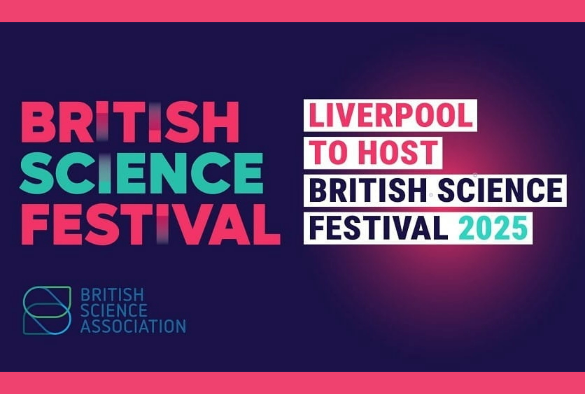
The British Science Association (BSA), the University of Liverpool and Liverpool John Moores University (LJMU) are pleased to announce that the British Science Festival for 2025 will take place in Liverpool across five days next September.
The Festival will be held between Wednesday 10 and Monday 15 September 2025, with events due to take place in venues across the city. The programme will feature roughly 100 free events, exhibitions, performances and installations that celebrate the people, stories and ideas at the heart of science.
Celebrating the 194th anniversary of the Festival, and working in partnership with the two co-hosting universities, the BSA will bring its flagship event to the city of Liverpool for the first time since 2008.
Hannah Russell, Chief Executive of the British Science Association, says: “We’re delighted to be bringing the British Science Festival to the city of Liverpool in 2025. The vibrant and diverse culture of Liverpool make it the ideal setting for our Festival, and I know that as a result the programme will be spectacular. It is a real honour for the BSA to be working alongside not just one, but two, world-leading research institutions in 2025, and I feel confident that we will achieve our shared goals of showcasing the transformative research and innovation taking place at Liverpool John Moores University and University of Liverpool.”
Established in 1881, the University of Liverpool is a globally-recognised institution that delivers world-class research and education, delivering a positive impact on both people and planet. Associated with nine Nobel Laureates, the University has an illustrious association with science and innovation. In 1896, an X-ray of a bullet in a boy’s hand was taken by the University’s Professor of Physics, Oliver Lodge – the first time X-ray photography was used for surgical purposes in the UK. Today, the University are spearheading innovative approaches to materials discovery for net zero solutions, transforming medicine and healthcare through therapeutics, and uncovering the deepest secrets of the Universe with unique technology and expertise in particle physics.
Professor Anthony Hollander, Pro Vice Chancellor for Research and Impact at the University of Liverpool, says: “Liverpool is a vibrant centre of research, education, science, and storytelling which will provide a fantastic setting for the festival. Engaging all our people and communities in the transformative power of scientific research and innovation is vitally important to address many key issues in the Liverpool city region, and stays true to our mission to advance learning and ennoble life.
“As a world-leading Russell Group University embedded in our wonderful city, we have a cutting-edge research and science portfolio with both local and global impact. We look forward to collaborating with Liverpool John Moores University and wider regional partners to deliver a brilliant Festival programme for everyone to enjoy.”
Liverpool John Moores University is a distinctive, unique institution, rooted in the Liverpool city region but with a global presence. The world is changing at incredible speed and the University’s research and knowledge exchange aims to explore new boundaries and impact the world around us by being at the forefront of educational and scientific innovation.
Over the past 200 years, LJMU has pioneered the first formal classes in navigation studies, when astronomy was used to guide ships across the seas and was the first UK university to launch the BSc Climate Change degree. Today, their scientists are operating the largest robotic telescope in the world, inspiring the next generation of space explorers, using AI to aid wildlife conservation, conducting forensic research and facial depiction to assist the criminal justice system, and utilising their sports science expertise to support Olympic research and inclusion.
Professor Keith George, Pro Vice Chancellor for Research and Knowledge Exchange at Liverpool John Moores University, says:“As anchor institutions for Liverpool and the city region we are proud that both Liverpool John Moores University and the University of Liverpool are joining forces to host the British Science Festival in 2025.
“The Festival will showcase the impactful and transformational work the universities and others undertake to promote innovation, social responsibility and a change for good.
“A festival of celebration that brings people and science together for mutual benefit and learning is going to be a flagship event for Liverpool and the city region.”
Steve Rotheram, Mayor of the Liverpool City Region, said: “I am delighted that the British Science Festival will be coming to the Liverpool City Region. As Mayor, building on the region’s history of innovation, I’m working to make our area an R&D powerhouse, forging ahead with new developments in health and life sciences, artificial intelligence and a wide range of other areas.
“But, as we attract new investment, start new businesses and create new jobs, I want to ensure that local people can take full advantage. Inclusive events like this are perfect opportunities to capture the imagination of the next generation and get them interested in the sciences. I hope that in years to come, there’s a Nobel Prize winner looking back at Liverpool’s time hosting the British Science Festival as the catalyst that set them on that path!”
The British Science Festival is one of Europe’s longest-established science festivals, which travels to a different part of the UK each year. It brings science to the wider public in the form of installations, exhibitions, talks, panel discussions, performances and more.
For more information about the British Science Festival 2025 and to stay up-to-date with events as they’re announced, visit the British Science Festival website or follow the Festival on X/Twitter and Facebook.
If you are an academic, local venue or regional business looking to get involved in the Festival, please contact the British Science Festival team on festival@britishscienceassociation.org.